Is Gardening a Stressful Job? Find Out Why It Might Be!
Is gardening a stressful job? While any job can have its tense moments, gardening might be one of the best occupations for reducing stress and improving well-being. Gardening offers a natural route to stress relief, allowing you to connect with nature and engage in physical activity, both of which are proven to boost your mental health (How and Why Gardening Is a Natural Stress Reliever).
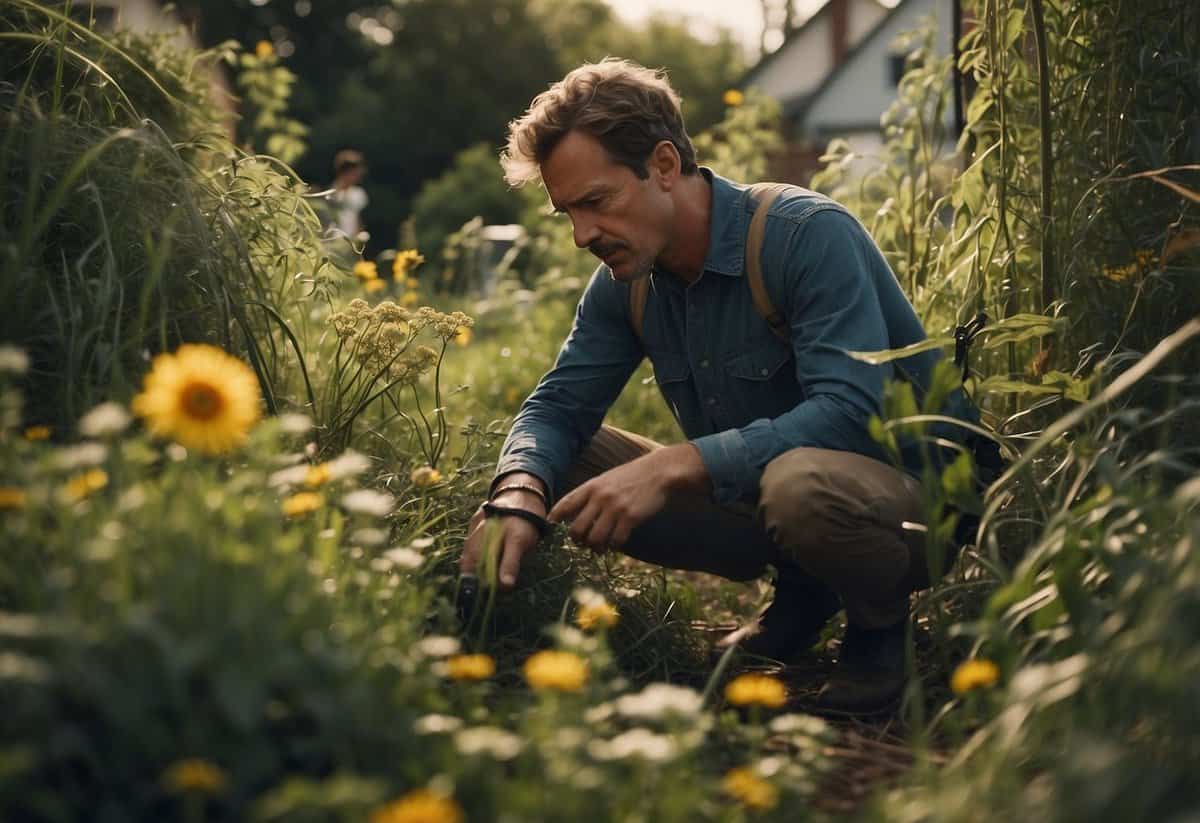
When you garden, you immerse yourself in mindful activity. Tending to plants, feeling the soil, and watching your garden grow provides a sense of achievement and joy. The process itself acts as a form of meditation, easing anxiety and lifting your mood (Why Does Gardening Feel So Good?).
On top of this, the physical exercise involved in gardening keeps your body moving, which is another key factor in combating stress. Getting outdoors and working with your hands in the garden doesn’t just improve your physical health; it’s also highly beneficial for mental clarity and positivity (10 Mental Health Benefits of Gardening). So, if you’re wondering whether gardening is stressful, you might find that it’s actually one of the more relaxing and rewarding jobs out there.
The Therapeutic Effects of Gardening
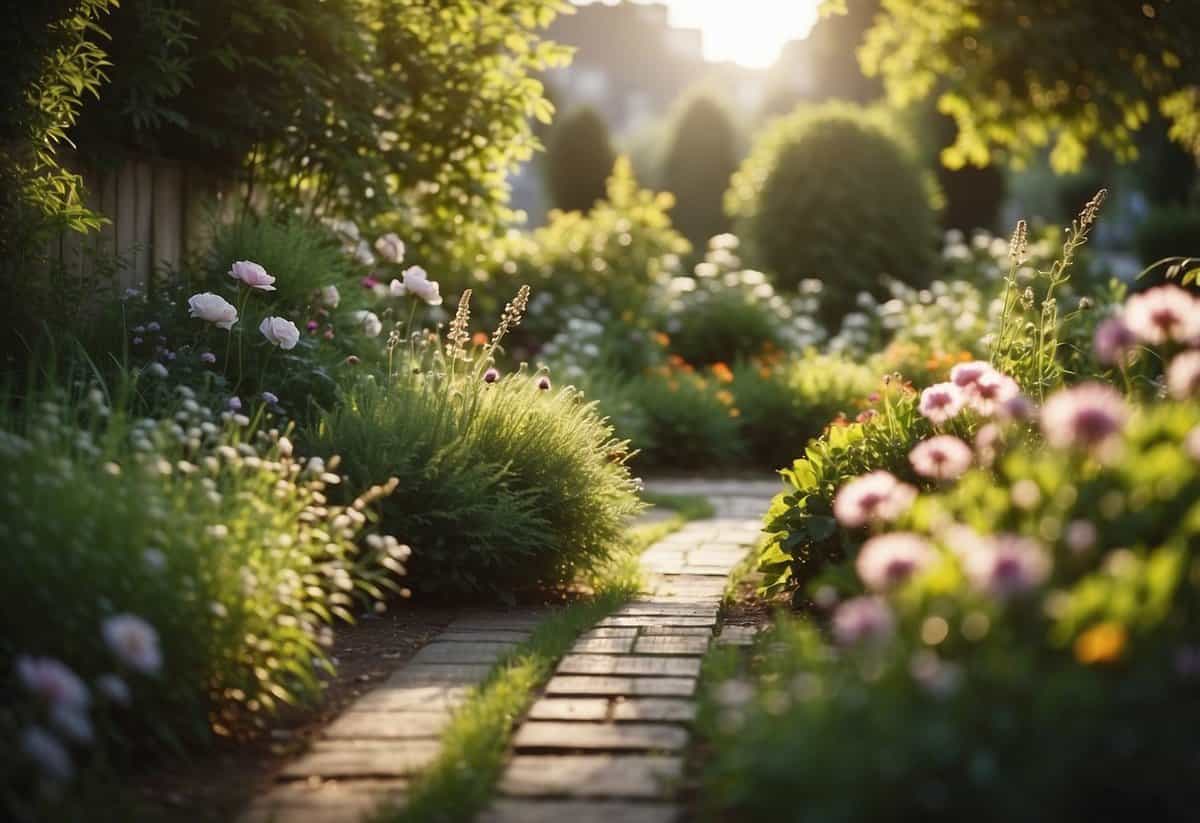
Gardening provides a sense of peace and solitude, exposes you to nature, and combines physical activity with mental relaxation. These elements work together to reduce stress and improve mental health.
Cultivating Peace and Solitude
When you garden, you create a personal haven. This space allows you to escape from daily pressures. The calming rhythm of planting and weeding helps clear your mind.
Spending time alone in the garden provides moments of solitude. Such peaceful experiences can lower stress levels and promote relaxation. Your garden becomes a retreat where you can disconnect from the chaos and find tranquility.
Exposure to Nature and Its Impact on Mood
Being outside in nature greatly affects your mood. The fresh air and sunlight you get while gardening boost your well-being. Sunlight provides vitamin D, essential for good health and mood regulation.
Gardening exposes you to natural beauty and green spaces. This connection to nature can increase levels of serotonin and dopamine. These chemicals in your brain make you feel happy and reduce stress. Time spent in nature has also been shown to lower the stress hormone cortisol.
Physical Activity and Its Role in Stress Management
Gardening involves physical activity, which is good for your body and mind. Moving around, digging, and carrying tools count as exercise. This activity can release endorphins, chemicals that improve your mood and reduce feelings of stress.
Staying active through gardening helps manage stress better. Exercise reduces levels of cortisol, a stress hormone, in your body. Gardening not only keeps you fit but also provides a natural way to de-stress. All this contributes to a healthier mental state and overall well-being.
Gardening as a Learning and Creative Outlet
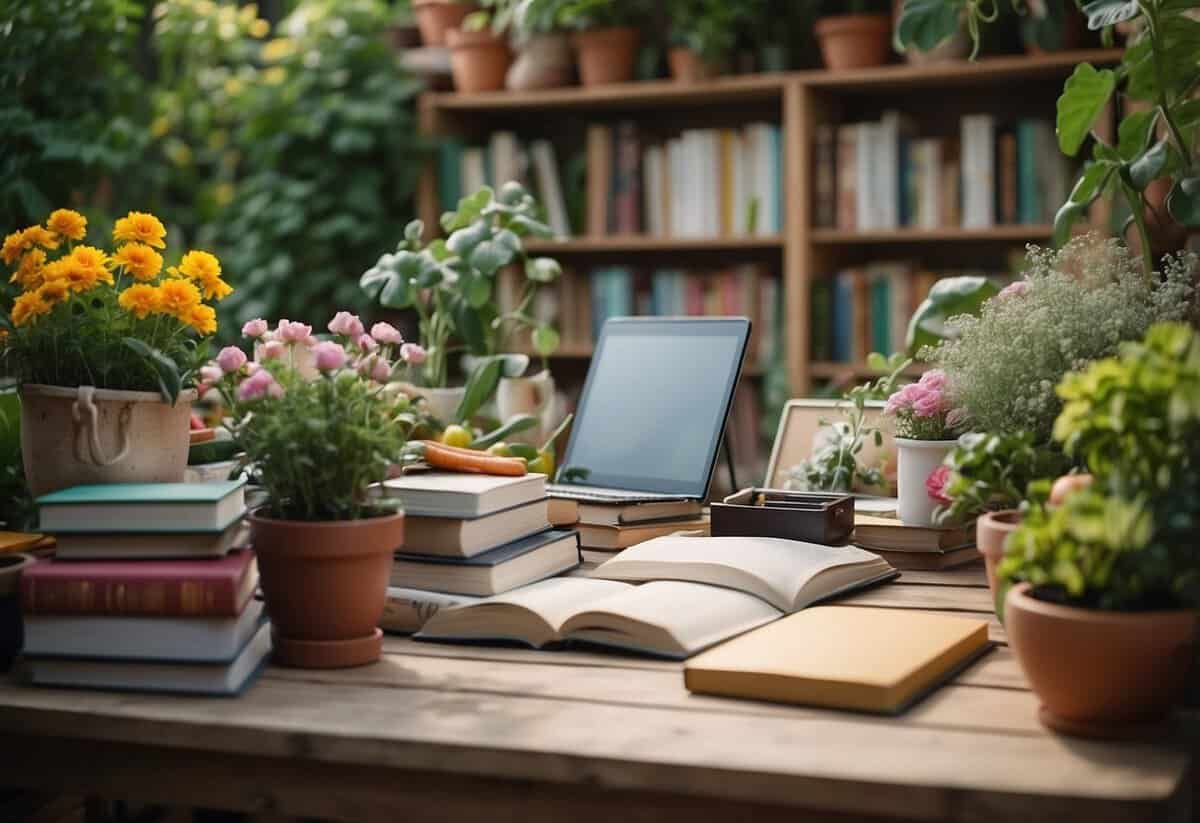
Gardening offers a mix of learning opportunities and creative expression. You not only enjoy the process of nurturing plants, but also have a chance to enhance your skills and find personal satisfaction.
The Joy of Learning and Mastery
Gardening teaches you about plant health, soil types, and weather patterns. As you gain more knowledge, you develop a sense of accomplishment. Identifying the right care for each plant, like knowing how much water or sunlight they need, becomes part of your daily routine.
You also learn about pest control and disease management. This knowledge helps maintain a healthy garden. Each new piece of information adds to your expertise, making you feel more confident and fulfilled.
Mistakes are part of the journey. If a plant doesn’t thrive, you figure out why and improve for next time. This process of trial and error enhances your problem-solving skills and resilience.
Creativity and Personal Growth in the Garden
Gardening is a great way to express creativity. Designing a garden layout lets you use your artistic side. You choose colors, textures, and plant varieties to create a unique space that reflects your personality.
You can experiment with different themes, like a butterfly garden or a herb garden. This creative outlet provides a break from your daily routine, offering a chance to relax and unwind.
Personal growth happens naturally as you overcome challenges in the garden. You learn patience and persistence, as plants take time to grow. Each success, no matter how small, adds to your sense of accomplishment and joy in the process.
Social and Community Benefits of Gardening
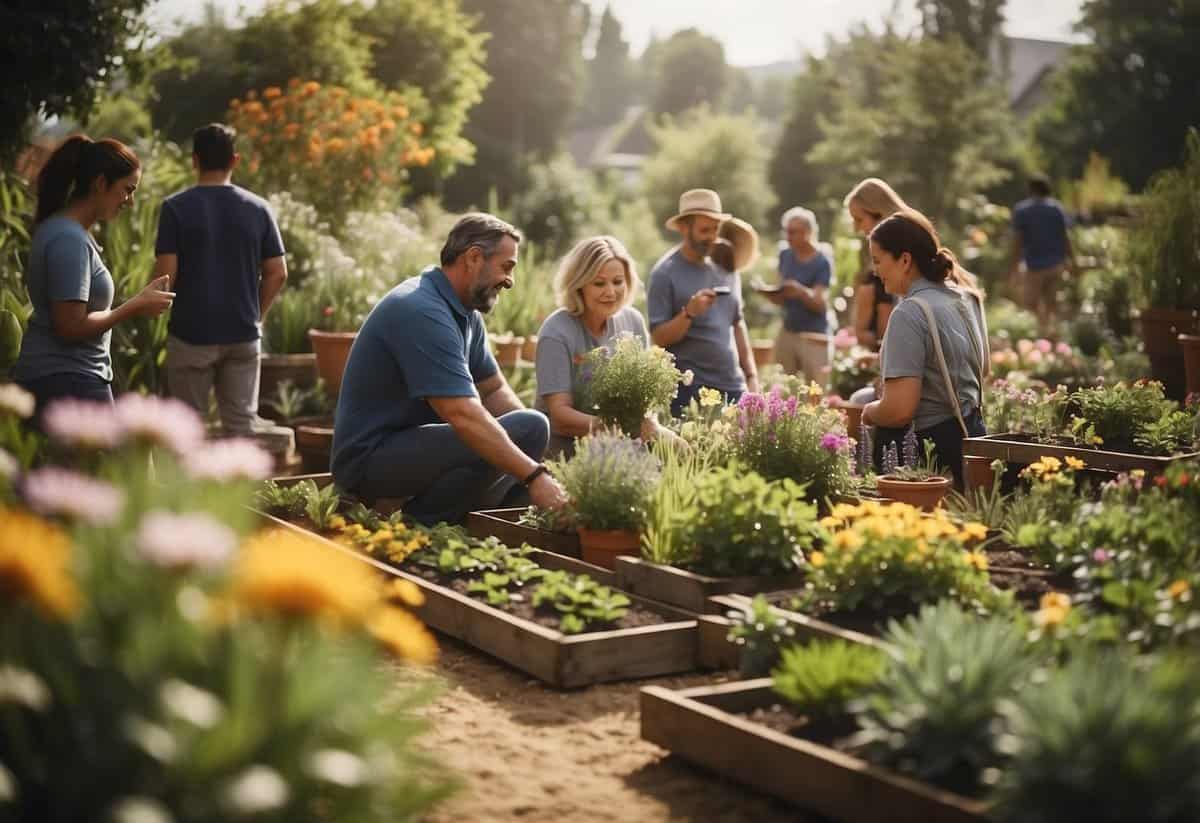
Gardening not only promotes individual well-being, but it also fosters stronger community bonds and social connections. Here, we explore how community gardening can bring people together and create a sense of belonging.
Building Community Through Shared Spaces
Community gardens offer a shared space where people from different backgrounds can come together and interact. This collective effort helps build a stronger sense of community. You work alongside your neighbors, share tools, and exchange tips, creating an atmosphere of collaboration and mutual support.
These gardens often serve as focal points for neighborhoods, hosting events and workshops that further enhance community cohesion. By participating in these activities, you get to know your neighbors better, fostering deeper connections and shared respect.
Being part of a community garden can also reduce feelings of isolation. Engaging in a common goal provides opportunities for social interaction, which is vital for emotional well-being. This sense of connectedness makes neighborhoods feel safer and more welcoming.
The Role of Gardening in Creating Bonds
Gardening offers a unique way to bond with others over a shared interest. When you garden with others, you naturally communicate and collaborate. This process not only strengthens personal relationships but also enhances social networks within your community.
Through activities like planting, watering, and harvesting, you build trust and camaraderie with fellow gardeners. Gardens can become a space where everyone feels valued and appreciated for their contributions.
Moreover, gardening can help bridge generational and cultural gaps. Older members pass down knowledge to younger ones, preserving traditions and fostering connectedness. This sharing of skills and experiences enriches the entire community.
Participating in community gardening initiatives enhances your appreciation for the environment and for each other, fostering a spirit of unity and teamwork. Whether you are an experienced gardener or a novice, your contributions help to cultivate both the garden and the community spirit.
Structuring Your Life Around the Garden
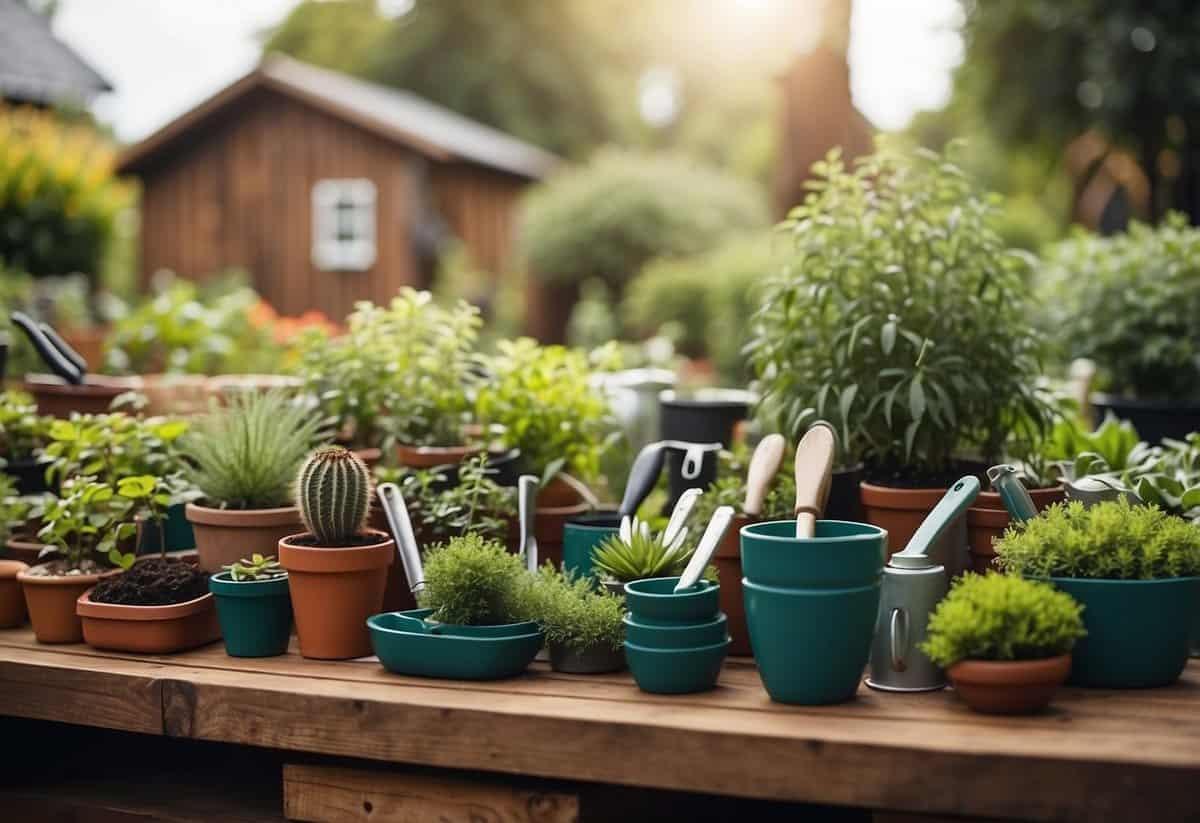
Gardening can provide both structure and a calming routine in your daily life. By establishing regular tasks and treating gardening as a mindful practice, you can reduce stress and find purpose.
Routine and Structured Tasks
Creating a routine around gardening helps bring structure to your day. When you establish a set schedule for your garden tasks, it allows you to plan your day better and creates a sense of control. You might start your mornings by watering plants or spend your evenings pulling weeds. Doing the same tasks regularly can help you feel more grounded.
Breaking down gardening into smaller tasks can also be beneficial. You should list out what needs to be done weekly or monthly. For example:
- Watering: Daily in the morning
- Weeding: Every weekend
- Pruning: Once a month
This structure helps reduce overwhelming feelings by keeping tasks manageable and predictable. Knowing what to expect and when to do certain jobs can reduce stress and give you a sense of accomplishment.
Gardening as a Form of Meditation
Gardening can be a form of meditation and mindfulness practice. Much like yoga, prayer, or repeating a mantra, tending to your garden can keep your mind focused and present. When you are mindful of your tasks, such as planting seeds or harvesting vegetables, you are less likely to dwell on daily stressors.
Spending time in nature while gardening can also help lower your stress levels. The act of being outside, feeling the soil, and watching your plants grow can have therapeutic effects. Studies have shown that being in a natural environment can boost your mood and mental health.
You can incorporate mindful breathing while gardening, treating each task with the attention it deserves. This approach transforms gardening into a peaceful and stress-relieving activity, helping you stay calm and centered.
Overcoming the Challenges of Gardening

Gardening can be both rewarding and challenging. Dealing with weather and environmental stressors, as well as balancing multitasking and focus, are key aspects gardeners need to manage.
Weather and Environmental Stressors
Weather conditions play a huge role in gardening. Rain, heat, frost, and wind can affect plant health. It’s important to stay informed about the local climate and forecast. By doing so, you can take steps to protect your plants.
Using mulch can help retain soil moisture and protect roots from extreme temperatures. Installing windbreaks can reduce wind damage. In cases of unexpected frost, covering plants with frost blankets or cloches can save them from cold damage.
Pests and diseases are also major stressors. Regularly inspect your garden for signs of trouble. Use organic pesticides and beneficial insects to control pests. Practicing crop rotation and maintaining garden hygiene can minimize disease risks.
The Balance of Multitasking and Focus
Gardening involves many tasks, from planting to watering to weeding. It’s easy to feel overwhelmed. Create a schedule or checklist to keep track of what needs to be done. Prioritize tasks based on urgency and importance.
Adopting efficient tools and technology can streamline garden work. Drip irrigation systems automate watering, saving time and effort. Smart garden devices can monitor soil moisture and nutrient levels, helping you make informed decisions.
Staying focused on one task at a time can improve efficiency. Set aside specific times for different activities. For instance, dedicate mornings to planting and evenings to watering. This way, you’re less likely to feel pulled in multiple directions.







